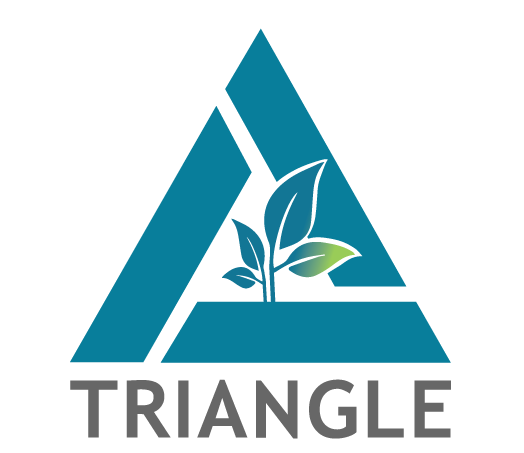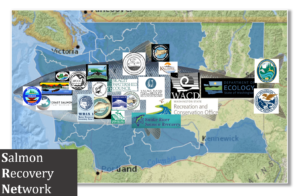Project Overview
Natural Resource Policy Facilitation
Salmon Recovery Network Workgroup Facilitation
SERVICE AREA: Facilitation and Mediation
The statewide Salmon Recovery Network, sponsored by the Salmon Recovery Funding Board and the Governor’s Salmon Recovery Office, brings together over 40 salmon recovery partners involving hundreds of stakeholders, tribes, and agencies with two objectives: to improve communications and information sharing and to develop a coordinated approach for achieving consensus-based conservation goals for salmon recovery. Triangle helped design and convene these stakeholders in a caucus-based workgroup and then worked with the Salmon Recovery Network workgroup to finalize a charter. Triangle continues to facilitate monthly meetings and conference calls and coordinates the sharing of important information throughout the Network.
Statewide Salmon Strategy Update Facilitation
SERVICE AREA: Facilitation and Mediation
The Triangle team was hired to facilitate the update to the Statewide Salmon Strategy by engaging partners from tribal nations, salmon recovery organizations, state and federal agencies, hydroelectric utilities, harvest interests, local government, and other partners. Triangle is working closely with the Governor’s Office, the Recreation and Conservation Office, the Governor’s Salmon Recovery Office, and the Washington Department of Fish and Wildlife to design the process for engaging Tribes and partners in the update of the plan. This has included the careful design of targeted stakeholder meetings and webinars, a process to engage tribal nations early in the update, and the design of assessment interviews with key subject matter experts.
Electric Utility Wildland Fire Prevention Task Force Facilitation
SERVICE AREA: Facilitation and Mediation
Triangle was hired by the Washington State Department of Natural Resources (DNR) to facilitate a multi-stakeholder Task Force convened by the Commissioner of Public Lands to advise DNR on policies and agreed-upon best practices for reducing the risk of wildland fire related to electric utility infrastructure. Earlier in 2019, the Washington State Legislature passed legislation that outlined the Task Force’s membership—including utilities, forest landowners, and DNR fire investigators—and its duties, including the development of a model agreement for managing danger trees outside of a utility’s easement. Triangle is supporting the Task Force by guiding the development of the Task Force’s Work Plan, conducting assessment interviews with each stakeholder, and facilitating Task Force meetings throughout 2020. The final product will be a report outline of Task Force recommendations to DNR, which will eventually appear before the Legislature.
Timber, Fish, and Wildlife Policy Committee Facilitation
SERVICE AREA: Facilitation and Mediation
Triangle has provided facilitation, mediation, and project management services for the Timber, Fish, and Wildlife (TFW) Policy Committee since 2012. Triangle currently works closely with the co-chairs and the Adaptive Management Program Administrator (AMPA) to plan for, execute, and follow up on each Policy Committee meeting. The Policy Committee is currently working on identifying the regulatory break between fish- and non-fish-bearing streams across the state, the outcome of which must consider the Endangered Species and Clean Water Acts, tribal treaty rights, and the timber industry’s continued economic viability.
Columbia River System Operations Environmental Impact Statement Technical Team Facilitation
SERVICE AREA: Facilitation and Mediation
Triangle Associates was hired by the National Policy Consensus Center (NPCC) through its program Oregon Consensus (OC) to provide facilitation services to the co-lead agencies working on the Columbia River System Operations (CRSO) Environmental Impact Statement (EIS). The co-lead agencies were the Bonneville Power Administration, the U.S. Bureau of Reclamation, and the U.S. Army Corps of Engineers. Triangle provided direct support to the leaders of both the Fish Technical Team and Socioeconomic Technical Team as they evaluated multiple operations and configuration alternatives for the 14 federal projects on the Columbia River/Snake River system and developed the Draft CRSO Environmental Impact Statement (EIS). Triangle’s facilitation team coordinated, facilitated, and summarized over 85 meetings with the Fish and Socioeconomic Teams involving over 130 invited tribal representatives and cooperating agencies throughout the states of Idaho, Montana, Oregon, and Washington.
In support of this project, Triangle prepared agendas and other process documents; organized and facilitated meetings including coordinating venues, managing technology, and communications with points of contact; coordinated and facilitated webinars and conference calls; summarized meetings and calls; provided overall project support services to the co-leads; assisted the co-leads with strategies for communicating and collaborating with representatives; managed conflicts ; and tracked ongoing review cycles, action items, and other scheduling details to support the Technical Teams and subgroups.
Washington State Department of Fish and Wildlife Hatchery and Fishery Reform Policy Update
SERVICE AREA: Facilitation and Mediation
In 2019, the Washington Department of Fish and Wildlife (WDFW) began a revision and update of the Hatchery and Fishery Reform Policy (C-3619). Triangle led a stakeholder assessment process and facilitated a public meeting to share results and status updates with stakeholders regarding the revisions. With input from the project team at WDFW, Triangle developed assessment questions designed to gather feedback on the existing Policy, its recent suspension, and the upcoming review and revision process, as well as to reveal the range of issues and concerns held by stakeholders. Triangle engaged and interviewed key stakeholders connected to hatchery reform from across a variety of perspectives and synthesized the collected input into a report for the Agency. Triangle also used the collected input to inform the agenda for the first stakeholder meeting on the policy review and revision. Triangle managed the planning process and facilitation of this stakeholder meeting, which included coordination of a live stream of the meeting. Triangle also provided the Agency with a detailed summary of the meeting and high-level facilitator’s findings from the process overall.
Lake Ozette Sockeye Steering Committee Facilitation
SERVICE AREA: Facilitation and Mediation
Between 2006 and 2019, Triangle staff supported the Lake Ozette Sockeye Steering Committee (LOSSC), a diverse partnership between NOAA Fisheries, landowners and local citizens, the National Park Service, the Makah and Quileute Tribes, timber companies, Washington state agencies, and Clallam County. This partnership plans and coordinates actions to recover Endangered Species Act (ESA)–listed Lake Ozette sockeye salmon. In 2009, Triangle designed, facilitated, and managed the collaborative process to write the 394-page ESA Recovery Plan for Lake Ozette Sockeye Salmon. Triangle helped NOAA Fisheries, which is responsible for the Plan, engage interested parties in limiting factors analysis and development of the content of the plan. After the release of the plan, Triangle facilitated quarterly meetings of the LOSSC as its members focused on implementing recovery actions. Additionally, Triangle provided secretariat and project management functions, consolidated technical documents, and facilitated technical subcommittees that worked on technical project design and public outreach. Triangle also facilitated an annual salmon viewing event and facilitated a Predation Workshop in 2016.
WA Department of Ecology Stream Flow Restoration Act/Tribal Resource Manager Workshop Facilitation
SERVICE AREA: Facilitation and Mediation
Hired by the Washington State Department of Ecology, Triangle facilitated a workshop with tribal governments and federal agencies on the implementation of the 2018 Stream Flow Restoration Act, which addresses offsets for county-issued permit-exempt wells. Triangle held pre-workshop interviews with tribes to discuss the implementation of the bill, the concept of Net Ecological Benefit, and related issues (water rights, instream flows, treaty rights, and tribal sovereignty). Triangle also wrote a report on workshop participants’ comments and concerns regarding implementation of the bill.
Washington’s Recycling Steering Committee Facilitation/Mediation
SERVICE AREA: Facilitation and Mediation
Following China’s implementation of its “National Sword” policy in January 2018, which banned the importation of many of Washington State’s recyclable materials, Triangle was contracted to convene and facilitate the Washington Department of Ecology’s (ECY) Recycling Steering Committee (RSC). Triangle led the project management, facilitation, and mediation for the RSC; led the stakeholder interview process through the assessment phase, coalesced the information collected, and developed a thematic summary to inform the meeting process; and teamed with ECY to help the RSC plan, prioritize, and advance their work goals, which were determined by RSC over six meetings.
The RSC consisted of 21 stakeholders from diverse and sometimes opposing aspects of the recycling system. Members had varying roles, perspectives, needs, and interests throughout the process and conflict between and during meetings was a common thread and area for Triangle’s expertise. Triangle facilitated the meetings strategically to provide resolution to some conflicts and to help the group find a shared path forward. The RSC developed recommendations for short-, medium-, and long-term actions to help to address the challenges facing the recycling system. These efforts led to the passage of HB 1543, which authorized the creation of a Recycling Development Center to incentivize new companies to process recyclable materials and develop more local end markets.
Skagit Environmental Endowment Commission Strategic Planning
SERVICE AREA: Facilitation and Mediation
Triangle facilitated the development of a 5-year strategic plan for the Skagit Environmental Endowment Commission (SEEC) made up of U.S. and Canadian representatives working on transboundary ecosystem management issues. The Team worked closely with the co-chairs from Seattle City Light and BC Ministry of Forests, Lands, Natural Resource Operations, & Rural Development to plan and facilitate a series of in-depth planning meetings with the Commission and partners to review and update SEEC’s strategic goals, objectives, and budget priorities to determine investments in ecosystem protection and recovery in the North Cascades.
Seattle Public Utilities Wildfire Risk Management Strategy
SERVICE AREA: Facilitation and Mediation
From 2015 to 2017, Triangle facilitated the development of a Seattle Public Utilities (SPU) wildfire risk management strategy for the Cedar River and Tolt Watersheds, which together serve as the City of Seattle’s primary water supply. Triangle led internal assessment interviews with SPU staff to inventory SPU’s current wildfire prevention and suppression activities and led an external assessment to inventory examples of wildfire risk management activities from other jurisdictions throughout the U.S. and Australia. Triangle staff developed and delivered a final wildfire risk management strategy report, which addressed a wide range of policy, technical and preparedness recommendations.
National Parks Overflights Advisory Group
SERVICE AREA: Facilitation and Mediation
Triangle worked with stakeholders, the National Park Service, and the Federal Aviation Administration to develop recommendations on commercial air tour operations over and near national parks. Triangle facilitated the National Parks Overflights Advisory Group, which consisted of environmental, tribal, and business representatives, as well as representatives from the Federal Aviation Administration (FAA) and National Park Service (NPS). To help this Advisory Group develop recommendations on safety, sound, environmental, and tribal issues, Triangle prepared agendas, offered live-meeting facilitation, summarized meeting outcomes, and worked with members before and after meetings to resolve conflict.
 Triangle Associates
Triangle Associates
